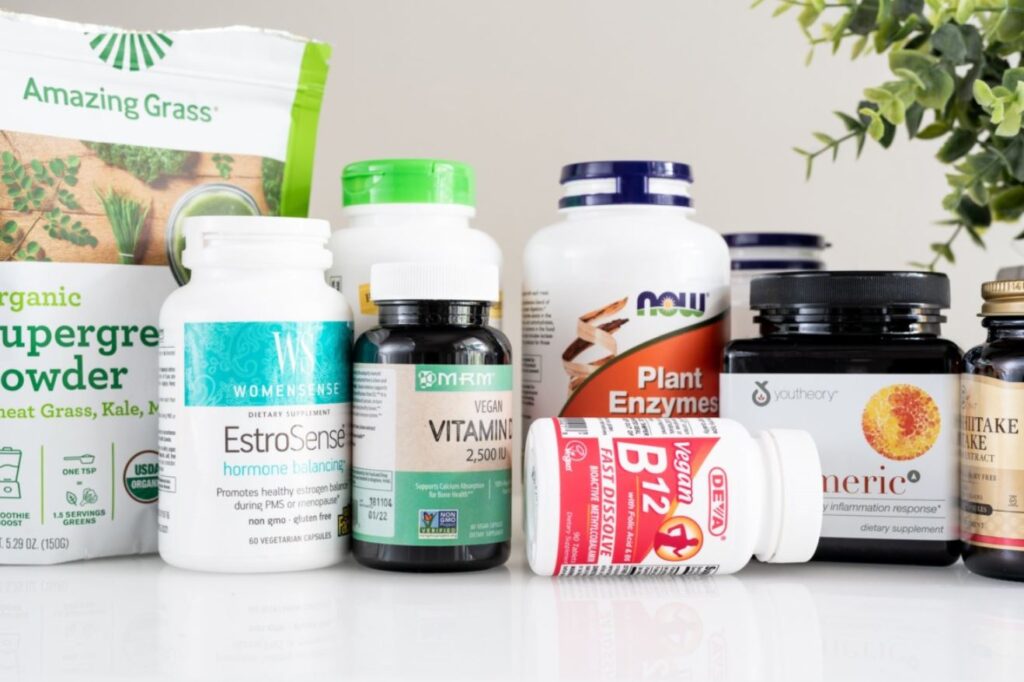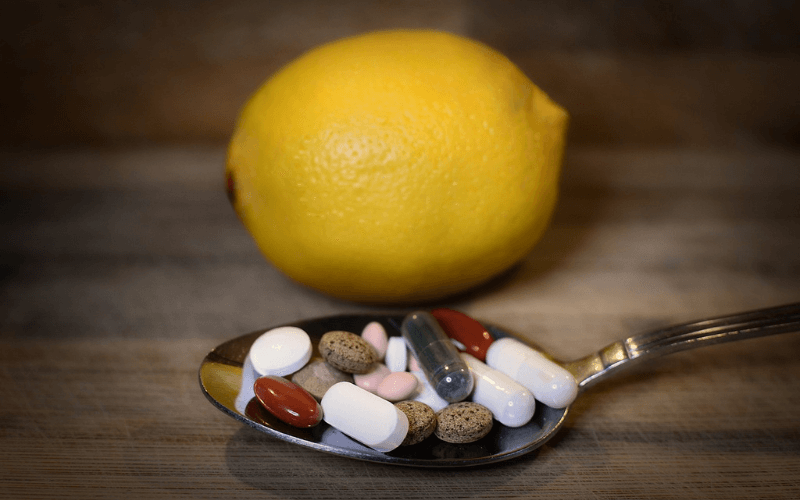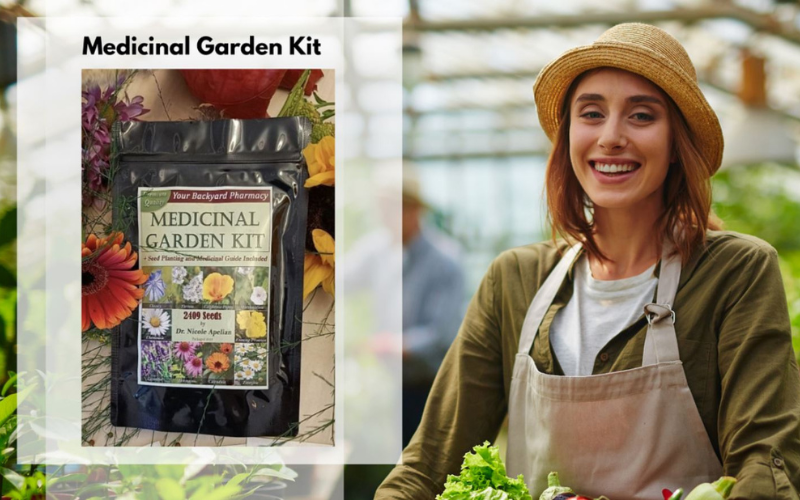Following a vegetarian diet can offer numerous health benefits, such as reducing the risk of heart disease, diabetes, and certain cancers. However, without careful planning, eliminating animal products can lead to nutrient deficiencies.
While a well-balanced vegetarian diet can provide most essential nutrients, certain vitamins and minerals may still be lacking. This is where supplements come into play.
In this article, we’ll cover the Good Supplements to Take for Vegetarians, highlighting key vitamins, minerals, and nutrients that are often missing from a plant-based diet. By incorporating these supplements into your routine, you can ensure your body gets all it needs to thrive.
- Why Do Vegetarians Need Supplements?
- Good Supplements to Take for Vegetarians: Complete List
- 1. Vitamin B12: Essential for Energy and Nerve Function
- 2. Iron: Crucial for Oxygen Transport
- 3. Omega-3 Fatty Acids: Vital for Heart and Brain Health
- 4. Vitamin D: The Sunshine Vitamin
- 5. Calcium: Essential for Bone Health
- 6. Zinc: Important for Immune Health
- 7. Iodine: Key for Thyroid Health
- 8. Vitamin K2: Supporting Bone and Heart Health
- 9. Protein: Building Blocks of Life
- 10. Multivitamins for Vegetarians: Cover All Your Bases
- The Role of Fortified Foods for Vegetarians
- Tips for Integrating Supplements into Your Routine
- Can You Get All the Nutrients from Food Alone?
- Conclusion: Supplement Smartly for a Balanced Vegetarian Diet
Why Do Vegetarians Need Supplements?
While a vegetarian diet can be nutrient-rich, some vitamins and minerals are more easily obtained from animal products.
For example, Vitamin B12, which is critical for nerve function and the production of red blood cells, is primarily found in meat and dairy. Iron, calcium, and omega-3 fatty acids can also be harder to get from plant-based foods.
Vegetarians who don’t carefully plan their diet may become deficient in these nutrients, which can lead to health issues like fatigue, anemia, or bone weakness.
Fortunately, supplements can fill these gaps and help vegetarians maintain a balanced diet. Let’s dive into the key supplements that vegetarians should consider.
Good Supplements to Take for Vegetarians: Complete List
When following a vegetarian diet, it’s essential to ensure you’re getting all the vital nutrients that might be harder to obtain from plant-based foods.
Key vitamins and minerals like Vitamin B12, iron, and omega-3 fatty acids are often limited in vegetarian diets, which can lead to deficiencies over time.
Incorporating the Good Supplements to Take for Vegetarians into your daily routine can help fill these nutrient gaps and support overall health. Below is a detailed list of the most important supplements every vegetarian should consider for a balanced, nutrient-rich diet.

1. Vitamin B12: Essential for Energy and Nerve Function
Vitamin B12 is a crucial nutrient that helps with the production of red blood cells and DNA, as well as maintaining healthy nerve function. This vitamin is primarily found in animal-based foods, which makes it one of the most common deficiencies for vegetarians and vegans. A deficiency in Vitamin B12 can lead to anemia, fatigue, muscle weakness, memory problems, and nerve damage.
Why It’s Important:
Vitamin B12 is essential for energy production and brain function. Without it, the body can’t produce enough red blood cells, leading to oxygen deficiency in tissues and organs. Long-term deficiency can cause irreversible nerve damage.
How to Supplement:
- Vitamin B12 Supplements: Available in capsules, tablets, or liquid forms. Aim for a dosage of 500-1000 mcg daily, depending on your dietary intake.
Plant-Based Sources:
- Fortified foods like plant-based milk, nutritional yeast, and fortified cereals are good dietary sources of B12 for vegetarians.
2. Iron: Crucial for Oxygen Transport
Iron plays a critical role in producing hemoglobin, the protein in red blood cells that transports oxygen throughout the body. Plant-based sources of iron (non-heme iron) are not as easily absorbed by the body as the heme iron found in animal products. This makes it more challenging for vegetarians to get enough iron through diet alone. Low iron levels can lead to anemia, weakness, and impaired cognitive function.
Why It’s Important:
Iron is essential for maintaining energy levels, cognitive function, and a healthy immune system. Without enough iron, your body can’t make enough red blood cells to carry oxygen efficiently, which leads to fatigue and reduced physical endurance.
How to Supplement:
- Iron Supplements: Choose iron supplements like ferrous sulfate or ferrous gluconate. Aim for 18 mg per day for women and 8 mg per day for men. Vegetarians may need slightly more to compensate for lower absorption rates.
Boosting Absorption:
- Pair iron-rich meals with Vitamin C (found in oranges, bell peppers, and tomatoes) to increase absorption of non-heme iron.
Plant-Based Sources:
- Lentils, chickpeas, spinach, pumpkin seeds, and quinoa are rich in plant-based iron.
3. Omega-3 Fatty Acids: Vital for Heart and Brain Health
Omega-3 fatty acids are essential fats that support brain function, reduce inflammation, and promote heart health. The two most important forms of omega-3s—DHA (docosahexaenoic acid) and EPA (eicosapentaenoic acid)—are typically found in fatty fish, which can make it difficult for vegetarians to get enough. Plant-based omega-3s (ALA or alpha-linolenic acid) from sources like flaxseeds and chia seeds must be converted by the body into DHA and EPA, but this conversion is inefficient.
Why It’s Important:
DHA and EPA are crucial for maintaining heart health, reducing inflammation, and supporting brain function. Omega-3s help protect against cardiovascular diseases and may also help reduce symptoms of depression and anxiety.
How to Supplement:
- Algal Oil Supplements: Algal oil is a plant-based source of DHA and EPA, the two most effective forms of omega-3s. Look for supplements that provide at least 250-500 mg of DHA and EPA combined daily.
Plant-Based Sources:
- ALA sources like flaxseeds, chia seeds, hemp seeds, and walnuts are good additions to a vegetarian diet, but they should be supplemented with algal oil for complete omega-3 support.
4. Vitamin D: The Sunshine Vitamin
Vitamin D is essential for calcium absorption and bone health, as well as supporting immune function. Although the body can produce Vitamin D through sun exposure, many people—especially those living in northern climates or who spend a lot of time indoors—may not get enough. Vitamin D is mostly found in fatty fish and fortified dairy, so vegetarians and vegans may need to supplement to ensure adequate intake.
Why It’s Important:
Vitamin D plays a vital role in calcium metabolism, supporting bone health and preventing osteoporosis. It also modulates the immune system and helps prevent chronic diseases like diabetes and multiple sclerosis.
How to Supplement:
- Vitamin D2 or D3 Supplements: Vitamin D3 is the more effective form of Vitamin D, but it’s traditionally derived from animal sources. However, there are now plant-based D3 supplements available (sourced from lichen). Aim for 600-1000 IU per day, but some people may need higher doses, especially during the winter months.
Plant-Based Sources:
- Fortified plant-based milks, orange juice, and mushrooms exposed to UV light are dietary sources of Vitamin D for vegetarians.
5. Calcium: Essential for Bone Health
Calcium is a key mineral for building and maintaining strong bones and teeth. It also plays a role in muscle function, nerve transmission, and hormone secretion. Dairy products are a major source of calcium in most diets, but vegetarians who limit dairy or avoid it entirely need to find alternative sources to avoid the risk of osteoporosis.
Why It’s Important:
Calcium is crucial for maintaining bone density, preventing osteoporosis, and supporting proper muscle function. Inadequate calcium intake can lead to brittle bones, muscle cramps, and an increased risk of fractures.
How to Supplement:
- Calcium Supplements: Look for calcium citrate or calcium carbonate supplements, and aim for 1000-1300 mg per day, depending on your age and sex.
Plant-Based Sources:
- Calcium-fortified plant-based milks, tofu, bok choy, kale, and almonds are great plant-based sources of calcium.
6. Zinc: Important for Immune Health

Zinc is a trace mineral that supports immune function, wound healing, and DNA synthesis. It also plays a role in maintaining the senses of taste and smell. While zinc is found in many plant-based foods, phytates in grains and legumes can inhibit zinc absorption, making it more difficult for vegetarians to get enough.
Why It’s Important:
Zinc is essential for a healthy immune system and helps the body fight off infections. It also supports skin health, aids in wound healing, and is important for DNA synthesis and cell growth.
How to Supplement:
- Zinc Supplements: Consider taking a zinc supplement, especially if you notice frequent colds or slow wound healing. Aim for 8-11 mg per day.
Plant-Based Sources:
- Chickpeas, lentils, pumpkin seeds, quinoa, and whole grains are good sources of plant-based zinc.
7. Iodine: Key for Thyroid Health
Iodine is critical for the production of thyroid hormones, which regulate metabolism, energy production, and growth. Iodine deficiency can lead to thyroid dysfunction, weight gain, and fatigue. Iodine is primarily found in seafood and dairy, so vegetarians, particularly vegans, may need to supplement or consume iodine-rich foods.
Why It’s Important:
Iodine supports healthy thyroid function and regulates metabolism, which impacts energy levels, mood, and even weight management. Without enough iodine, you may experience hypothyroidism or an enlarged thyroid gland (goiter).
How to Supplement:
- Iodine Supplements: Iodine can be found in multivitamins or taken as a separate supplement. Aim for 150 mcg per day.
Plant-Based Sources:
- Seaweed (nori, kelp, and wakame) is an excellent source of iodine. Be cautious with the amount of seaweed consumed, as excessive iodine can also cause thyroid issues.
8. Vitamin K2: Supporting Bone and Heart Health
Vitamin K2 plays a crucial role in bone health by helping to regulate calcium deposition. It ensures that calcium is directed to the bones and teeth, where it’s needed, and prevents calcium buildup in the arteries, which can lead to cardiovascular issues. While Vitamin K1 is found in leafy greens, Vitamin K2 is primarily found in fermented foods and animal products, making it harder for vegetarians to obtain.
Why It’s Important:
Vitamin K2 works with Vitamin D to promote bone density and prevent the calcification of arteries, which helps maintain heart health. It’s also important for blood clotting.
How to Supplement:
- Vitamin K2 Supplements: Look for MK-7 (the most bioavailable form of K2) in supplements. Aim for 90-120 mcg per day.
Plant-Based Sources:
- Natto (fermented soybeans) is a rare plant-based source of Vitamin K2.
9. Protein: Building Blocks of Life
Protein is essential for muscle repair, enzyme function, and overall cell health. While vegetarians can get enough protein from plant-based foods, it can be more challenging for those with higher protein needs, such as athletes or people who are pregnant or breastfeeding.
Why It’s Important:
Protein provides the building blocks for muscle, skin, hair, and other tissues. It’s crucial for maintaining muscle mass, supporting metabolism, and aiding in recovery after exercise.
How to Supplement:
- Plant-Based Protein Powders: Supplements like pea protein, hemp protein, or soy protein powders are great for adding extra protein to your diet, especially after workouts. Aim for 15-30 grams of protein per serving, depending on your daily needs.
Whole Food Protein Sources:
- Beans, lentils, tofu, tempeh, quinoa, and edamame are excellent sources of plant-based protein.
10. Multivitamins for Vegetarians: Cover All Your Bases
If managing individual supplements seems overwhelming, a high-quality vegetarian multivitamin can be a convenient way to ensure you’re meeting your nutritional needs. A well-rounded multivitamin should contain essential nutrients like Vitamin B12, Vitamin D, iron, zinc, and iodine.
Why It’s Important:
Multivitamins help fill in any potential nutritional gaps in your diet, ensuring you get a wide range of essential vitamins and minerals every day.
How to Supplement:
- Supplement Type: Look for a multivitamin specifically formulated for vegetarians or vegans that includes B12, D3, iron, calcium, and zinc.
Recommended Dosage:
- Follow the dosage instructions on the product label, but ensure that the multivitamin contains at least the daily recommended amounts of the key nutrients mentioned above.
The Role of Fortified Foods for Vegetarians
In addition to supplements, fortified foods can help vegetarians meet their nutrient needs. Many plant-based foods are fortified with essential nutrients like Vitamin B12, calcium, and iron, making them an easy and convenient way to get more of these important nutrients.
Common Fortified Foods for Vegetarians:
- Plant-Based Milks: Almond, soy, and oat milk are often fortified with calcium, Vitamin D, and B12.
- Breakfast Cereals: Many cereals are fortified with iron, folate, and B12.
- Nutritional Yeast: A popular vegan food, nutritional yeast is often fortified with B12 and is great for adding a cheesy flavor to dishes.
- Tofu and Plant-Based Meat Alternatives: Tofu and some plant-based meat products are fortified with calcium, iron, and omega-3s.
Advantages of Fortified Foods:
- Convenient: Fortified foods can easily be incorporated into everyday meals.
- Less Reliance on Pills: For those who prefer to get nutrients from food rather than supplements, fortified products provide an effective way to boost nutrient intake.
When to Supplement in Addition to Fortified Foods:
If you don’t consume fortified foods regularly or have specific health concerns, adding supplements to your routine ensures you’re getting adequate levels of key nutrients. Fortified foods are an excellent addition to a balanced diet but may not always provide the full amount of nutrients you need, especially for B12 and omega-3s.
Tips for Integrating Supplements into Your Routine

Taking supplements can feel like an added task to your daily routine, but it doesn’t have to be complicated. Here are some practical tips to ensure you remember to take your supplements consistently:
1. Set a Schedule
Create a routine by taking your supplements at the same time every day, such as with breakfast or dinner. Some supplements, like Vitamin D, are best absorbed with food, particularly those containing fat, while others, like iron, may be better absorbed on an empty stomach. Consult the instructions on your supplement labels or your healthcare provider for optimal timing.
2. Use a Pill Organizer
A simple pill organizer can help keep track of multiple supplements. You can organize your supplements by day and time to ensure you’re getting the right dose without missing any nutrients.
3. Track Your Progress
Keep a journal or use a mobile app to track your supplement intake. Note how you feel over time, including improvements in energy, mood, skin, and overall health. Tracking your progress will help you stay motivated and ensure that you’re reaping the full benefits of supplementation.
4. Pair with Food
Taking supplements with certain foods can enhance their absorption. For example, pairing iron with Vitamin C-rich foods like oranges or bell peppers can improve iron absorption. Similarly, taking fat-soluble vitamins like D and K with healthy fats, such as avocado or nuts, can enhance their effectiveness.
5. Stay Consistent
Consistency is key with supplements. Nutrient deficiencies often take weeks or months to develop, and similarly, restoring nutrient levels can take time. Stick with your supplement routine for at least 4-6 weeks before expecting to see noticeable results in your energy, mood, or health.
Can You Get All the Nutrients from Food Alone?
While it is possible to get most nutrients from food, it can be challenging for vegetarians to obtain optimal amounts of certain vitamins and minerals. This is particularly true for nutrients like Vitamin B12, which is nearly absent in plant foods, or omega-3s, which are found in fish but harder to source from plants in their most bioavailable form (DHA and EPA).
The Importance of Whole Foods
Whole foods like fruits, vegetables, legumes, and grains are packed with fiber, antioxidants, and phytochemicals that supplements can’t fully replicate. Therefore, it’s always a good idea to prioritize whole, nutrient-dense foods in your diet. Foods like spinach, beans, quinoa, nuts, and seeds are excellent sources of key vitamins and minerals.
However, there are times when supplements may be necessary or beneficial:
- Lifestyle or Dietary Restrictions: Some vegetarians may avoid fortified foods (such as processed cereals or plant-based milks), making it harder to get enough B12, calcium, or Vitamin D.
- Increased Nutrient Needs: Pregnant women, athletes, or individuals with health conditions may have higher nutrient requirements, making supplements a valuable tool for meeting these needs.
- Geographical Factors: If you live in areas with little sun exposure, it may be difficult to get enough Vitamin D through diet alone, necessitating a supplement.
Ultimately, supplements should complement a healthy vegetarian diet, not replace it.
Conclusion: Supplement Smartly for a Balanced Vegetarian Diet
Following a vegetarian diet offers numerous health benefits, but it’s essential to be mindful of potential nutrient deficiencies. By incorporating the good supplements to take for vegetarians into your daily routine, you can ensure that your body gets the vital nutrients it needs for optimal health. Whether you choose to supplement with Vitamin B12, iron, omega-3s, or a combination of nutrients, doing so can help prevent deficiencies and support your overall well-being.
Remember, before starting any new supplements, it’s always a good idea to consult with a healthcare professional, especially if you have specific health concerns or conditions.





